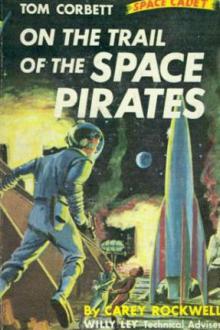Triplanetary - E. E. Smith (phonics reader TXT) 📗

- Author: E. E. Smith
Book online «Triplanetary - E. E. Smith (phonics reader TXT) 📗». Author E. E. Smith
“You say that you think that it’s safe, and yet you won’t take a crew,” Samms argued. “In that case it isn’t safe enough for you two, either. We need you too badly to permit you to take such chances.”
“You’ve got to let us go, because we are the only ones who are at all familiar with her theory,” Rodebush insisted. “I said, and I still say, that I think it is safe. I can’t prove it, however, even mathematically; because she’s altogether too full of too many new and untried mechanisms, too many extrapolations beyond all existing or possible data. Theoretically, she is sound, but you know that theory can go only so far, and that mathematically negligible factors may become operative at those velocities. We do not need a crew for a short trip. We can take care of any minor mishaps, and if our fundamental theories are wrong, all the crews between here and Jupiter wouldn’t do any good. Therefore we two are going—alone.”
“Well, be very careful, anyway. I wish that you could start out slow and take it easy.”
“In a way, so do I, but she wasn’t designed to neutralize half of gravity, nor half of the inertia of matter—it’s got to be everything or nothing, as soon as the neutralizers go on. We could start out on the projectors, of course, instead of on the neutralizers, but that wouldn’t prove anything and would only prolong the agony.”
“Well, then, be as careful as you can.”
“We’ll do that, Chief,” Cleveland put in. “We think as much of us as anybody else does—maybe more—and we aren’t committing suicide if we can help it. And remember about everybody staying inside when we take off—it’s barely possible that we’ll take up a lot of room. Goodbye!”
“Goodbye, fellows!”
The massive insulating doors were shut, the metal side of the mountain opened, and huge, squat caterpillar tractors came roaring and clanking into the room. Chains and cables were made fast and, mighty steel rails groaning under the load, the spaceship upon her rolling ways was dragged out of the Hill and far out upon the level floor of the valley before the tractors cast off and returned to the fortress.
“Everybody is under cover,” Samms informed Rodebush. The Chief was staring intently into his plate, upon which was revealed the control room of the untried super-ship. He heard Rodebush speak to Cleveland; heard the observer’s brief reply; saw the navigator push the switch-button—then the communicator plate went blank. Not the ordinary blankness of a cutoff, but a peculiarly disquieting fading out into darkness. And where the great spaceship had rested there was for an instant nothing. Exactly nothing—a vacuum. Vessel, falsework, rollers, trucks, the enormous steel I-beams of the tracks, even the deep-set concrete piers and foundations and a vast hemisphere of the solid ground; all disappeared utterly and instantaneously. But almost as suddenly as it had been formed the vacuum was filled by a cyclonic rush of air. There was a detonation as of a hundred vicious thunderclaps made one, and through the howling, shrieking blasts of wind there rained down upon valley, plain, and metaled mountain a veritable avalanche of debris; bent, twisted, and broken rails and beams, splintered timbers, masses of concrete, and thousands of cubic yards of soil and rock. For the atomic-powered “Rodebush-Cleveland” neutralizers were more powerful by far, and had a vastly greater radius of action, than the calculations of their designers had shown; and for a moment everything within a hundred yards or so of the Boise behaved as though it were an integral part of the vessel. Then, left behind immediately by the super-ship’s almost infinite velocity, all this material had again become subject to all of Nature’s everyday laws and had crashed back to the ground.
“Could you hold your beam, Randolph?” Samms’ voice cut sharply through the daze of stupefaction which held spellbound most of the denizens of the Hill. But all were not so held—no conceivable emergency could take the attention of the chief ultra-wave operator from his instruments.
“No, sir,” Radio Center shot back. “It faded out and I couldn’t recover it. I put everything I’ve got behind a tracer on that beam, but haven’t been able to lift a single needle off the pin.”
“And no wreckage of the vessel itself,” Samms went on, half audibly. “Either they have succeeded far beyond their wildest hopes or else … more probably. …” He fell silent and switched off the plate. Were his two friends, those intrepid scientists, alive and triumphant, or had they gone to lengthen the list of victims of that man-killing spaceship? Reason told him that they were gone. They must be gone, or else the ultra-beams—energies of such unthinkable velocity of propagation that man’s most sensitive instruments had never been able even to estimate it—would have held the ship’s transmitter in spite of any velocity attainable by matter under any conceivable conditions. The ship must have been disintegrated as soon as Rodebush released his forces. And yet, had not the physicist dimly foreseen the possibility of such an actual velocity—or had he? However, individuals could come and go, but the Service went on. Samms squared his shoulders unconsciously; and slowly, grimly, made his way back to his private office.
“Mr. Fairchild would like to have a moment as soon as possible, sir,” his secretary informed him even before he sat down. “Senator Morgan has been here all day, you know, and he insists on seeing you personally.”
“Oh, that kind, eh? All right, I’ll see him. Get Fairchild, please … Dick? Can you talk, or is he there listening?”
“No, he’s heckling Saunders at the moment. He’s been here long enough. Can you take a minute and throw him out?”
“Of course, if you say so, but why not throw the hooks into him yourself, as usual?”
“He wants to lay down the law to you, personally. He’s a Big Shot, you know, and his group is





Comments (0)